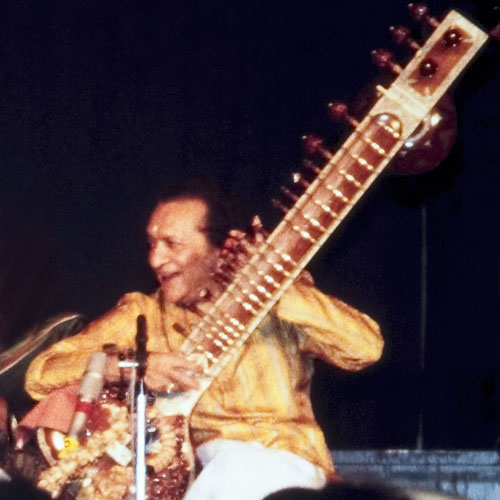UMS Playlist: Pandit Ravi Shankar: A Retrospective
This post is a part of a series of playlists curated by UMS staff, artists, and community. Check out more music here.

Ravi Shankar in 1988. Photo by Alephalpha.
For many, the name Ravi Shankar is synonymous with Indian music. Indeed, in his nearly 70 year career he performed Hindustani (North Indian) classical music in nearly every corner of the globe, positioning him, in the words of India’s Prime Minister Manmohan Singh, as “a national treasure and global ambassador of India’s cultural heritage.” But his staggering body of work did not only pave the way for other Indian musicians. His innovations and undeniable presence on the global stage helped create the genre we now know of as “world music,” which continues to impact on cultural interaction and the way we experience culture in the modern world.
More than that, though, Pandit Ravi Shankar taught us what it means for an artist to be a true innovator. Even within the historically established tradition of Hindustani classical music, he constantly pushed forward, looking for new directions and new contexts for his music. Still, throughout this process he never lost sight of the tradition from which he came. This is the true nature of innovation: to retain the utmost humility before one’s roots, but with the fearlessness to take risks and try something new. In 2005 I had the pleasure of hearing Pandit-ji speak prior to a concert at Hill Auditorium. When asked what music his was listening to for inspiration, he answered, “I only listen to my own music.” Even then, after 60 years of recording, touring, and composing, he was still evaluating his work and striving for something more. He was 85 years old.
In this small collection from Ravi Shankar’s substantial discography, I have tried to paint a picture of the breadth of his musical life. From his early travels abroad with his brother, Uday Shankar, to his legendary performance at the Monterey Pop Festival. From his ground-breaking Concerto for Sitar and Orchestra to his collaborations with Philip Glass. From his Academy Award-nominated score for the film Gandhi to recordings he made only months before his death. His was a career that not only served as a link between India and the world, but that defined what it means to be a musician on the world’s stage.
Interested in learning more? Check out the program from Ravi Shankar’s performance in Ann Arbor in 1996.
What did you think about this playlist? Share your thoughts or song suggestions in the comments below.






